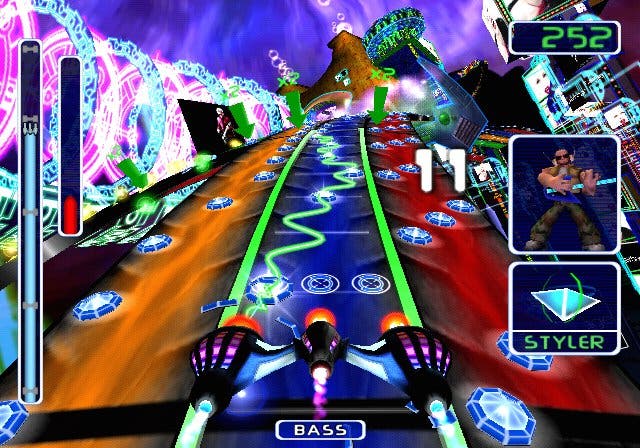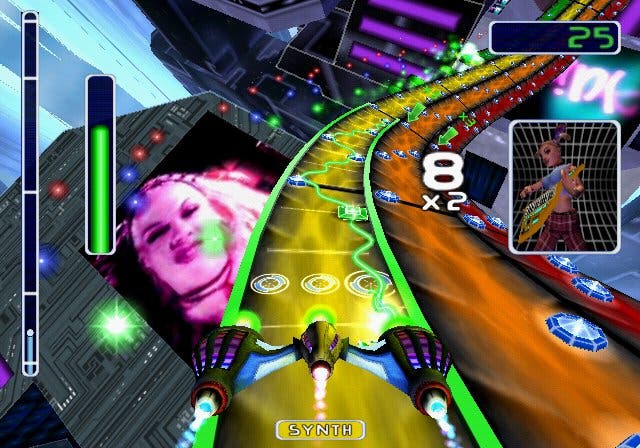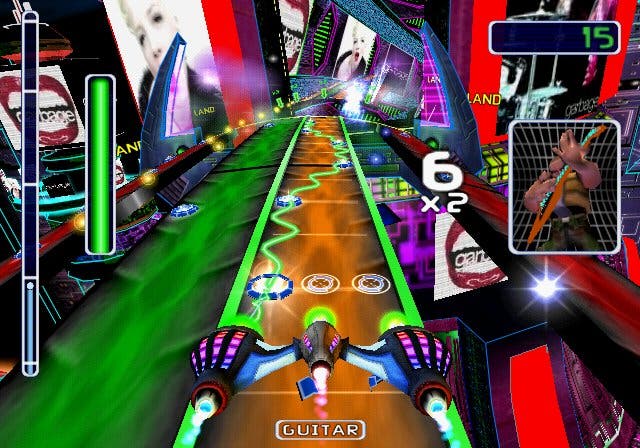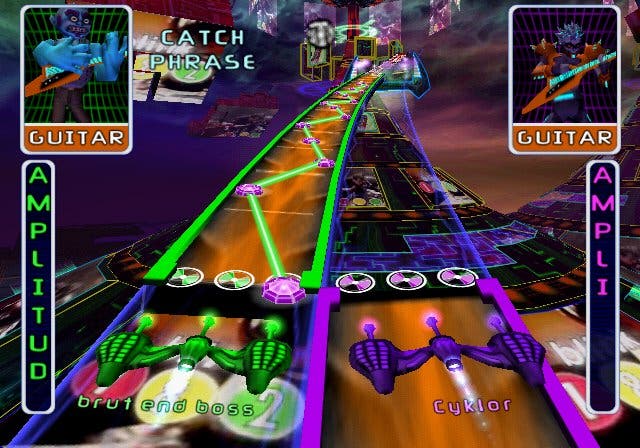Amplitude
Tom plays a while to soothe our spirits.
Since we posted our thoughts on Amplitude (not a review, boss!) a little while ago, various readers have been in contact. "That's very nice dears," they generally concede, "but what's new in Amplitude that wasn't in Frequency?" Well, mortals, it's very simple: different music, more levels, twisty tracks, a spaceship, and online play. That's about it really. And yet it's still so much...
With A Capital Q

For those who never played Frequency, the following is true of both games: you have to press buttons in time to the music like some kind of psychedelic bastard offspring of the rhythm action genre. Songs are represented on-screen as a series of strips running parallel into the distance, each strip representing a different part of a song (vocals, keyboards, guitars, drums, etc), and each split into bars and dotted with little icons that represent beats. As your little spaceship's crosshairs run over each bar, you'll discover that beats appear on the left, in the middle, or on the right, and that each has a corresponding button - the idea being to press it as you pass over the top. Complete a couple of bars of an instrument without fault and the next eight or so will be handled by the AI, allowing you to move over to other parts of a song using the D-pad or analogue stick - even accumulating combos by doing so without dropping bars or beats.
You can also collect power-ups along the way, like the Auto-blaster, which allows you to rack up the next eight bars of a particular instrument as if you'd successfully played them and concentrate your attention elsewhere; the Freestyler, which lets you go wild, wiggling the D-pad or analogue stick whilst holding various buttons to draw lines in the air and carve out your own custom rhythms; and the rather more self-explanatory Slow-Mo and Score Doubler.
The trick to success is to get to the end of a tune without screwing up too much. Miss too many bars in succession and your Energy Bar will deplete and eventually drain, at which point you'll have to restart (although, pleasingly, the game tells you how far you got). With enough success you'll progress through the single player campaign and move up the four difficulty levels, and various stages within - each comprising three songs, a harder, unlockable boss song and a bonus track requiring a certain standard to access.
Woman, Look!

And... that's basically how it works. There isn't much more to say. Apart from telling you how much fun it is, everything else is a bit superfluous. Although you'll have days when you can't string a pair of bars together (especially if you're one of those poor rhythm deficient souls), and those high scores and note-activation percentages seem totally unattainable, on a good day playing Amplitude is intense, exhilarating, enjoyable and spectacular. Certainly, once you're proficient at darting between instruments and zipping across to the green strip just in time to keep Shirley Manson wailing, even your girlfriend will be able to appreciate how good you are. Heck, she might even fancy a go herself. As long as she can master the Start/Shit!/Restart gameplay. And see the screen.
Played loudly in a front room, Amplitude is likely to polarise opinion. Anybody who isn't directly involved will learn to curse incomplete tunes (or just the tunes in general) as they assault the ear, pouring scorn on the player when he misfires consistently. Our advice is to make them watch. Actually that's always our advice. Anybody watching will feel every pulsating beat and tap their feet to help the player stay in time, whilst simultaneously gorging themselves on the spiralling, psychedelic on-screen mayhem.
Although the player might not always be able to appreciate the graphical side of the game, it's a rich tapestry of Winamp/Windows Media style visualisations and music video snippets, with a central, multicolour track that stoops and soars, swinging this way and that like a drunken snake. Going back to Frequency's static tunnelling is a bit depressing - and anybody dismissing Amplitude's approach as frivolous showboating need only attempt some of the harder difficulty levels, and watch how the visuals are used to obscure upcoming bars and increase the game's challenge.
Strum Along With Me

Good though Amplitude is, however, there are times when it can feel a bit contrived, and even needlessly frustrating. Unlike a lot of people, the rhythm never managed to get us, or we never got it - whatever. The point is that some of the tracks in Amplitude are just way too fast for our rubbery thumbs and primitive cerebellums [and shit sense of rhythm? - groovy Ed], and no matter how long and hard we play, we cannot complete some of the bars on Brutal difficulty level - never mind 'Insane'. Normal, and a couple of levels of Brutal, is about our limit, and it didn't take us more than a few frantic but enjoyable hours to overcome these levels and hit a brick wall.
Fortunately, aptly named developer Harmonix obviously foresaw this and threw in a Remix mode, which allows you to... well, guess... and distribute your creations amongst friends and even over the Internet (if Sony happens to think they're worth keeping), along with a selection of multiplayer modes. You can even play it online using Sony's currently rather pointless broadband adapter.
The basic method of playing Amplitude with other people is certainly different. For us, having the ability to make our opponent's screen wobble, or Auto-blast his strips for ourselves, is all very well, but one of the best things about the single player game is building your own massive combos, and although it's still possible to do this in the face of such adversity, it's a total pain in the arse. "Duel" is a much better multiplayer option in our eyes, allowing one player to take on a tune and then asking the next player to pick a better path.
Bad Music Made Easier

Curiously, one of the things it barely occurred to us to mention here (phew, eh?) is the actual songs on offer. Strange? Actually no. For some reason, it doesn't really matter whether you like a particular type of music or not - Amplitude somehow manages to pull it off. For example, we hate drum and bass. In our eyes, there is nothing more heinous [What? Not even comedy/ironic Metal? - Ed]. And yet despite that the only objection we had to a number of dnb tracks was being completely unable to keep up the beat [It's that old devil called spasmo rhythm again, see - Groovemeister Ed]. We even got along with songs by Mekon ("What's Going On?"), P.O.D. ("Boom"), Blink 182 ("The Rock Show") and Papa sodding Roach. And we hate those songs.
But not in Amplitude. Although there are certainly times when the artists seem like the best target for frustrated complaining (and our neighbours probably don't like the sound of Production Club or Herbie Hancock either at this point), and off-screen reaction is more like banging heads than headbanging, completing a song for the first time and opening up the next set is a magical feeling. We even dug out a David Bowie record to celebrate completing "Everyone Says Hi". Imagine that.
Nope, if we had to criticise anything in Amplitude, it would be the game's longevity. Although we're still digging it out roughly every other night to try and better ourselves, we're not hugely impressed by the multiplayer offering, and there really isn't more than about six to eight hours for the average lone player, and the unlockable "FreQ" outfits and body parts are pretty pointless. It remains to be seen whether downloading remixes will keep us going for any length of time, but we wouldn't put money on it. Downloading extra songs would be nice, but this is PS2 Online, not Xbox Live...
Bleeding Thumbs Up
To pull out an old but fitting cliché, "Amplitude rocks". It's easy to pick up (with two suitably patronising tutorials) and surprisingly addictive, despite a lot of songs we don't even like. Although there's a definite question mark hanging over the scope for continued multiplayer interest, we'd be fools not to give this a big mark and a thumbs-up. Encore!


